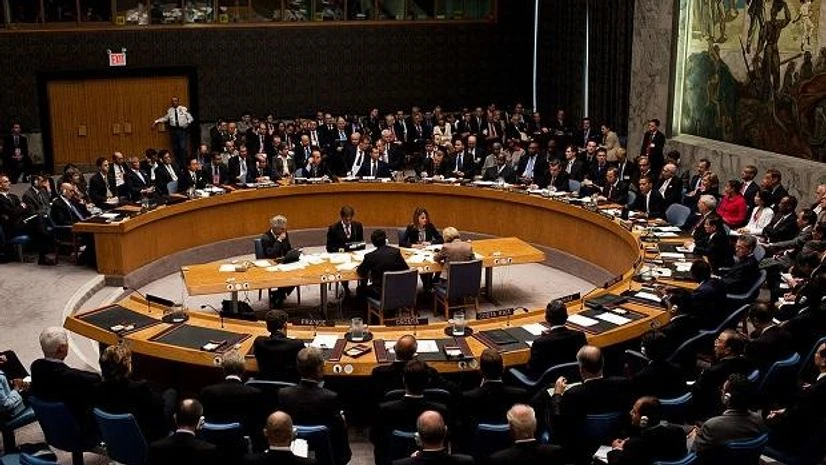India on Tuesday (local time) raised concerns over Opium poppy cultivation, Taliban-Al-Qaida relations and erosion of human rights at a United Nations Security Council briefing on Afghanistan.
Indian Ambassador to UN, Ruchira Kamboj, the chair of UNSC's 1988 sanctions committee, also known as the Taliban Sanctions committee, said, " In its latest report to the 1988 Committee of May 2022, the Monitoring Team noted that 41 United Nations-sanctioned individuals occupied cabinet and senior positions in the Taliban administration. This number is now believed to be over 60."
The Monitoring Team report also reiterated the relations between the Taliban and Al- Qaida. She said the relations remained close and are underscored by the presence, both in Afghanistan and the region, of Al-Qaida core leadership and affiliated groups such as the Al-Qaida in the Indian Subcontinent (AQIS).
On August 1, the United States had announced that the leader of Al-Qaida was killed in a Kabul compound at the end of July. However, the same has not yet been confirmed by the Taliban and Al-Qaeda.
Kamboj also raised concern over further erosion of human rights, including the rights of women and girls, as well as the lack of progress on inclusive governance in the country.
The administration in Kabul remains overwhelmingly Taliban, she said, adding, "Since taking power, concerns have been expressed that the group has reversed policies and gone back on commitments made prior to assuming power."
On the production of narcotics in Afghanistan, Kamboj said, "Despite a decree issued by Taliban in April, banning the cultivation, use and trafficking of narcotics, including the fanning of opium poppy, UN reported a 32 per cent increase during 2021 in opium cultivation with 2022 opium prices have soared due to cultivation ban announcement."
More From This Section
Poppy cultivation, accompanied by an ongoing boom in methamphetamine production and trafficking, remains Afghanistan's largest illicit economic activity, she highlighted.
The Monitoring Team has also reported that the ISIL-Khorasan (ISIL-K) (Da'esh) remains a primary threat in Afghanistan and in the region, as demonstrated by its regular attacks against Afghanistan's neighbouring States as well as against minority ethnic and religious communities in the country.
"Another worrying fact is the attacks of ISIL-K (Da'esh) against diplomatic embassies and their personnel. Moreover, ISIL-K (Da'esh) maintains the potential to attract disillusioned Taliban and foreign fighters into its ranks, thereby enhancing its capability to carry out attacks and its ability to regain territorial hold in the country, as well as the potential to establish a so-called Islamic caliphate in the region in the future," said the Indian envoy.
Speaking about the challenges posed to the Taliban regime by the presence of the National Resistance Front and other anti-Taliban groups, she said, "As you are aware, the 1988 Committee's desired goal through the use of its sanctions measures is to support a peaceful, stable and prosperous Afghanistan by deterring support to terrorist entities, and to support peace and stability discussions."
She said that there is potential for further outbreaks of fighting in the absence of a real or sustained dialogue.
On the travel ban, she said, "A travel ban exemption granted in April 2019 to a group of listed Taliban with a view to enable them to engage in peace and stability discussions in a range of countries expired in August 2022 and was not extended since the Committee was unable to reach a consensus on the same. However, the Committee stood ready to consider exemptions on the travel ban on a case-by-case basis based on relevant resolutions and Committee guidelines with the overall objective of aiding peace and stability in Afghanistan."
The Indian envoy also highlighted that the humanitarian needs in Afghanistan remain dire.
"You will recall that following the uncertainty that came in the wake of the August 2021 Taliban takeover of Afghanistan, the Security Council acted to clarify that humanitarian assistance and other activities that support basic human needs in Afghanistan are not a violation of paragraph 1 (a) of resolution 2255 (2015), and that the processing of payments of funds, other financial assets, economic resources, and provision of goods and services needed to support humanitarian aid delivery are permitted. This opened the door for much-needed finance and aid delivery in order to mitigate the impact of the crisis. The sanctions committee heard a briefing from the OCHA on 4 April 2022 on the humanitarian activities in Afghanistan," she said.
She reiterated that the 1988 Committee can, and will, support creation of an environment conducive to forming a peaceful and stable Afghanistan, free of terrorism and drugs.
(Only the headline and picture of this report may have been reworked by the Business Standard staff; the rest of the content is auto-generated from a syndicated feed.)

)
